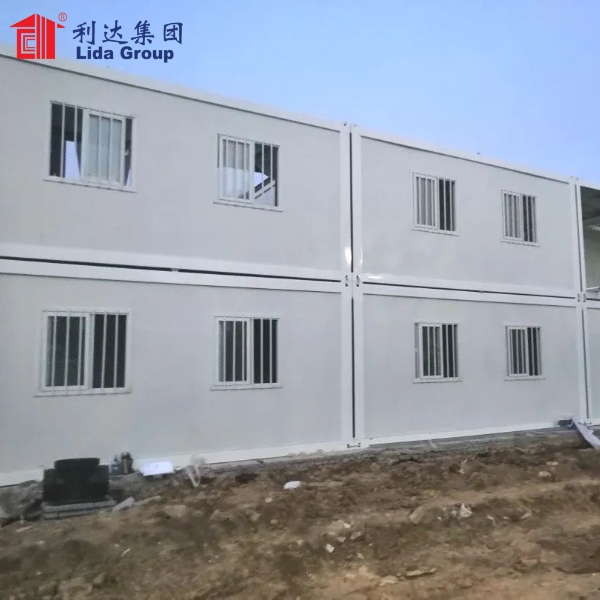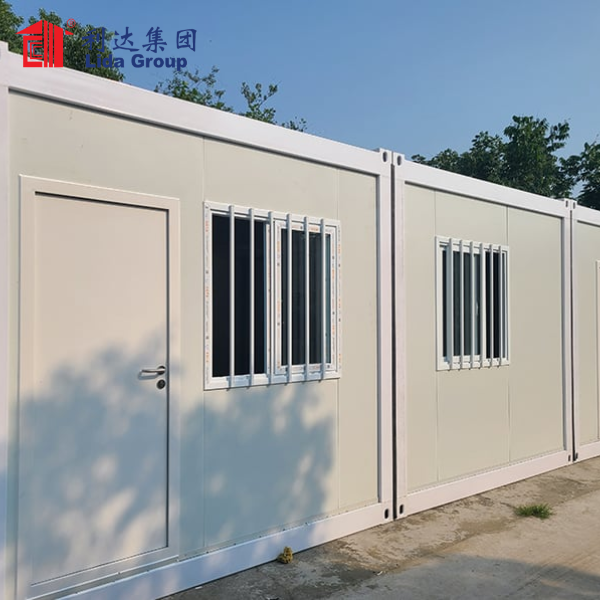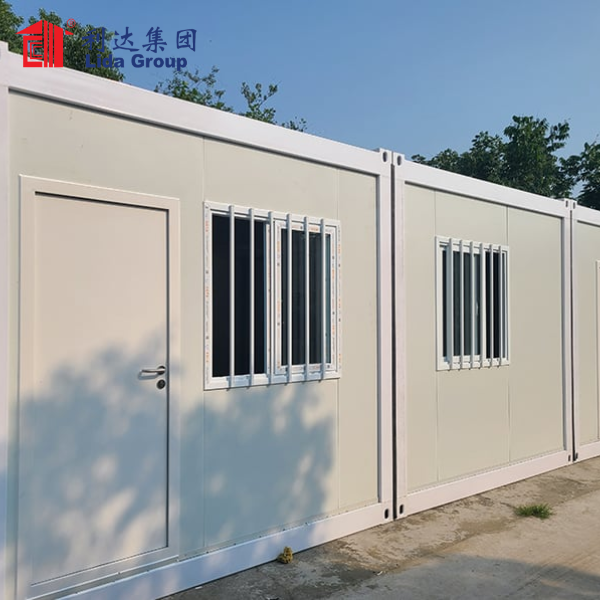Introduction:
Sustainable urban development is a critical aspect of creating livable cities for future generations. Lida Group, with its container building initiatives, is leading the way in promoting environmentally conscious and socially responsible urban development. In this article, we will explore Lida Group’s efforts in sustainable urban development through container buildings, examining their benefits, impact on communities, and contribution to a greener and more inclusive urban landscape.
- The Need for Sustainable Urban Development:
1.1 Urbanization and Environmental Challenges:
Rapid urbanization has led to numerous environmental challenges, including increased energy consumption, waste generation, and carbon emissions. Sustainable urban development aims to address these challenges by creating cities that are environmentally friendly, resource-efficient, and resilient to climate change.
1.2 Social and Economic Equity:
Sustainable urban development also focuses on promoting social and economic equity. It seeks to create inclusive communities that provide affordable housing, access to essential services, and opportunities for all residents, regardless of their socio-economic background.
1.3 The Role of Sustainable Architecture:
Architecture plays a crucial role in sustainable urban development. By embracing innovative building practices and materials, architects and developers can minimize the environmental impact of construction, reduce energy consumption, and create buildings that enhance the well-being of residents.
- Lida Group’s Container Building Initiatives:
2.1 Repurposing Shipping Containers:
Lida Group’s container building initiatives utilize repurposed shipping containers as the primary building material. These containers, which would otherwise end up in landfills or sit unused in ports, are transformed into functional living and working spaces, reducing waste and promoting resource conservation.
2.2 Energy Efficiency:
Container offices designed by Lida Group prioritize energy efficiency. Through effective insulation, energy-saving appliances, and renewable energy integration, these structures minimize energy consumption and lower greenhouse gas emissions. This commitment to energy efficiency not only benefits the environment but also reduces utility costs for residents.
2.3 Modular and Scalable Design:
Container buildings offer a modular and scalable design, allowing for flexible and efficient construction. Lida Group’s container building initiatives employ standardized building units that can be easily combined to create various configurations, from single-family homes to multi-story apartment complexes. This adaptability makes container buildings suitable for different urban contexts and evolving community needs.
2.4 Rapid Construction:
Container buildings are prefabricated off-site, resulting in faster construction times compared to traditional building methods. Lida Group’s container building initiatives leverage this advantage, enabling the timely delivery of affordable housing solutions and contributing to meeting the growing demand for urban housing.
2.5 Sustainable Materials and Practices:
Lida Group prioritizes the use of sustainable materials and construction practices in their container building initiatives. From eco-friendly insulation and low VOC (volatile organic compound) finishes to rainwater harvesting and green roof installations, these initiatives exemplify the company’s commitment to minimizing environmental impact throughout the entire building lifecycle.
- Benefits of Lida Group’s Container Building Initiatives:
3.1 Affordable Housing:
Lida Group’s container buildings provide an affordable housing solution for urban dwellers. By utilizing repurposed shipping containers and efficient construction methods, these initiatives offer cost-effective housing options that are accessible to a wider range of income groups. This helps address the issue of housing affordability in rapidly growing cities.
3.2 Quick Response to Housing Needs:
Container buildings can be rapidly deployed to address urgent housing needs in disaster-stricken areas or communities facing sudden population influx. Lida Group’s container building initiatives have the potential to provide temporary or permanent housing solutions in a relatively short period, ensuring that affected communities have a safe and secure place to live.
3.3 Revitalization of Underutilized Spaces:
Container buildings can revitalize underutilized spaces within urban areas, such as vacant lots or abandoned properties. By repurposing these spaces, Lida Group’s initiatives contribute to the revitalization of neighborhoods, transforming neglected areas into vibrant and sustainable communities.
3.4 Reduced Environmental Impact:
The use of repurposed shipping containers and sustainable building practices significantly reduces the environmental impact of construction. Lida Group’s container building initiatives help conserve natural resources, reduce waste generation, and lower carbon emissions, making a positive contribution to mitigating climate change and preserving the environment.
- Impact on Communities:
4.1 Social Inclusion:
Lida Group’s container building initiatives promote social inclusion by providing affordable housing options for diverse socio-economic groups. These initiatives contribute to creating mixed-income communities, fostering social cohesion, and reducing spatial segregation within cities.
4.2 Community Engagement and Empowerment:
Container buildings can serve as catalysts for community engagement and empowerment. Lida Group’s initiatives involve residents in the design and planning process, allowing them to have a voice in shaping their living environment. This participatory approach strengthens community bonds and instills a sense of ownership and pride among residents.
4.3 Education and Awareness:
Container buildings can be used as educational tools to raise awareness about sustainable building practices and environmental conservation. Lida Group’s initiatives can incorporate educational programs and demonstrations that showcase thebenefits of sustainable architecture and inspire others to adopt similar practices. By promoting sustainability and environmental awareness, these initiatives contribute to building a more conscious and responsible society.
4.4 Economic Opportunities:
Lida Group’s container building initiatives create economic opportunities within communities. The construction and maintenance of container buildings generate employment, fostering local economic development. Additionally, these initiatives can stimulate entrepreneurship and small business growth, as container buildings can be repurposed for commercial and community uses, such as retail spaces or co-working hubs.
- The Future of Sustainable Urban Development:
5.1 Scalability and Expansion:
Lida Group’s container building initiatives have the potential for scalability and expansion. As the demand for sustainable and affordable housing continues to rise, container buildings can be further integrated into urban development strategies. Their modular design allows for easy replication and adaptation to different contexts, enabling the creation of sustainable communities on a larger scale.
5.2 Collaboration and Knowledge Sharing:
The success of sustainable urban development relies on collaboration and knowledge sharing among stakeholders. Lida Group’s container building initiatives can serve as models for other developers, architects, and city planners, inspiring them to embrace innovative and sustainable building practices. By sharing their experiences and lessons learned, Lida Group can contribute to a collective effort towards creating more sustainable and inclusive cities.
5.3 Policy and Regulatory Support:
To fully realize the potential of sustainable urban development, supportive policies and regulations are crucial. Governments and local authorities can play a significant role in facilitating the adoption of container building initiatives by providing incentives, streamlining approval processes, and integrating sustainable building practices into urban planning frameworks. Lida Group’s container building initiatives can serve as examples to inform policy development in the context of sustainable urban development.
Conclusion:
Lida Group‘s container building initiatives are at the forefront of sustainable urban development, showcasing the potential of repurposed shipping containers as a viable and environmentally friendly building material. These initiatives promote energy efficiency, affordability, and social inclusion while minimizing the environmental impact of construction. By revitalizing underutilized spaces, providing affordable housing solutions, and fostering community engagement, Lida Group’s initiatives have a transformative impact on urban landscapes.
The success of sustainable urban development relies on collaborative efforts, knowledge sharing, and supportive policies. Lida Group’s container building initiatives serve as a catalyst for change, inspiring other stakeholders to embrace sustainable building practices and contribute to the creation of livable and resilient cities. As cities continue to grapple with the challenges of urbanization and environmental sustainability, Lida Group’s container building initiatives offer a promising solution that can lead to a greener, more inclusive, and sustainable urban future.
Post time: Sep-26-2023



